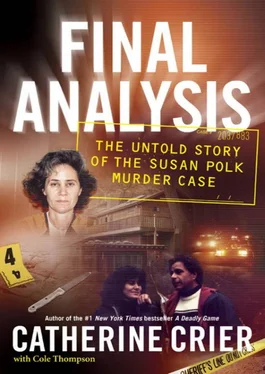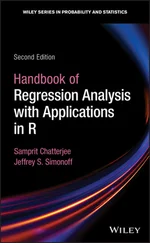Dr. Polk’s gravelly voice sounded like a dull hum. He instructed her to count backward from ten.
She methodically followed along. “Ten…nine…eight…seven…six…”
“Susan!” the psychologist’s raspy voice startled her awake. It felt as if only seconds had passed since she’d sipped from her teacup. Yet the office clock had advanced forty-five minutes. Glancing over at the coffee table, Susan observed that her teacup was empty, and her mouth had a funny taste.
Uneasiness swept over her as she struggled to recall what had taken place. The last thing she remembered was counting backward. Now it was time to leave.
“What happened? What did we talk about?” she asked, feeling a sudden pang of mistrust. “How come I can’t remember anything?”
Dr. Polk appeared nervous and avoided her gaze. Rising from his chair, he escorted her to the door.
He would see her again in two days.
Susan still does not know what occurred during the hypnotic session. She later claimed that, from that day forward, she felt afraid whenever Felix Polk was around.
Not long after Susan began her therapy, she was arrested for shoplifting some clothing from a local store. The probation officer assigned to her case took an instant liking to her but also recognized the signs of an adolescent at risk: Delicate and frail, the girl appeared in need of mothering.
It was clear that the teen was troubled but punishment was not the answer. What Susan needed was mental health counseling, and her probation officer told the judge as much. This girl was too fragile for the juvenile detention center, the officer argued, not to mention the fact that there were some pretty tough kids in there. But her opposition did nothing to change his mind, and the judge sentenced Susan to one month in the Martinez lock-down facility, a place filled with delinquents, mostly teenage runaways.
During her time there, Felix Polk went to visit Susan, and his visit upset her. Seeing him reminded her of their hypnosis sessions. It was unsettling that she could not recall many of the details, and she believed there were things going on that were highly irregular.
She had been sent to Dr. Polk for an evaluation. He was supposed to help her anxiety, the panic she was feeling every morning before leaving for school; but now, she was locked away with a bunch of degenerate runaways. All her life, she tried to be a good girl. She primped to look pretty and remembered her manners, yet here she was in a place for delinquent youths.
How had her life become so unmanageable?
The only thing she could do now was run away again. She wanted to be free of Felix, her mother, and everything else in her teenage life. One afternoon, she escaped from the juvenile facility. It wasn’t hard; a number of kids had done it. Susan simply hitched a ride with someone in the parking lot. She went to a friend’s apartment in Trestle Glenn, a nice Oakland neighborhood.
It was fun staying with her girlfriend who was engaged to a navy man. The two never made her feel like a third wheel when she joined them on their dates. To the contrary, she felt part of a unit, something she had never experienced. The apartment was peaceful, and Susan felt “normal” for the first time. She had companionship, someone to share meals with, to talk to. It was the happiest she had been in a long time.
After a month on her own, Susan decided to return home and placed a call to her mother. Helen Bolling was now living in a small house she purchased for twelve thousand dollars in a community south of Concord. With its large homesteads and centuries-old eucalyptus trees dotting the rolling green hillsides, the unincorporated city of Orinda was a definite step up for the family. At the time, Orinda was still a farming town with orchards covering much of the landscape and no main shopping district. The home Helen had purchased was in the “low-rent” section of town, across the tracks from fancier, more expensive homes nestled in the hills.
Helen was surprised to hear from her daughter. Uncertain how to proceed with Susan’s desire to return home, Helen immediately called Dr. Polk to find out if her daughter could come back without being rearrested.
There were indications that Helen was aware Dr. Polk was employing some unusual techniques during the sessions with her teenage daughter. Susan had confided that she’d sat on Dr. Polk’s lap during one appointment. The approach sounded a bit unorthodox, but it was the early 1970s in Berkeley, California. Things were pretty fast and loose. For Helen, the doctor’s behavior could well be part of a new trend in adolescent therapy. In the back of her mind, she may have sensed that something was going on between Dr. Polk and her daughter, but for whatever reason she did nothing about it.
Dr. Polk said he would take care of everything.
As promised, Felix Polk wrote a letter to the court explaining why Susan Bolling had run away and received permission for her to come home. In exchange, the court mandated that Susan return to her therapy with Dr. Polk and attend a continuation school to complete her ninth grade studies.
Ironically, the psychologist whom Susan had been sent to see for a simple evaluation had somehow become the person responsible for her freedom.
Felix Polk, it seemed, was going to be a powerful force in Susan’s life.
Chapter Two
MORTAL COMBAT
On the night of October 13, 2002, floodlights broke the darkness and illuminated chunks of the brick walkway that led to the guesthouse of the Polk’s rambling Orinda residence. Set high in the hills on a steep slope, the house had several levels—with two bedrooms, including the master suite, on the top floor. Another bedroom and a laundry area were one floor below. The main living area and a home office were situated on the first floor.
It was sometime after 10 PM when forty-four-year-old Susan Bolling Polk climbed the flagstone steps to the guesthouse, built adjacent to a free-form swimming pool. Flashlight in hand, she entered the small redwood cottage through the living room door. Inside, her husband of twenty-one years sat reclined in an oversized leather chair. It was a brisk night, yet Felix was clad only in a pair of black briefs, seemingly engrossed in a novel, The Company, about the CIA.
At seventy, the doctor was still in decent shape; he was tanned and toned from the long jogs that were part of his regular routine. Tired and worn from his nearly 800-mile roundtrip drive to Los Angeles that day, remarkably he was still awake when Susan came to speak to him that night. Aside from the redwood paneling, the rectangular living room of the pool house looked somewhat like Felix’s old Berkeley office on Ashby Avenue, with a couple of leather chairs and a busy tapestry rug of reds and blues. The couple had done little to update the sprawling property since purchasing it for nearly $2 million eighteen months earlier. In an attempt to realize Felix’s dream of living in the now-wealthy suburb of Orinda, the family had overextended themselves financially and the monetary pressure was adding to the already stressful home life.
Within minutes of Susan’s entry into the cottage, the couple was arguing—a common occurrence ever since Susan announced four years earlier that she wanted to leave the marriage.
“You’d better think of the consequences,” Felix had warned her in an annoyed voice at the time. “You’ll never get the kids! You’re not fit!”
Her husband’s angry retort hit a nerve with Susan. His words were like an assault. Felix had always been a kind of Svengali to Susan, and she believed everything he told her. She thought that he had the power to commit her if he wanted to, and for Susan, there was nothing scarier than being put in a mental institution. She had already been committed once to the Kaiser mental facility when she was fifteen—and she’d never go back again.
Читать дальше











